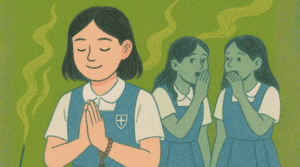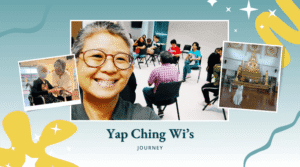This teaching is extracted from the Q&A section of a Dhamma talk by Ajahn Brahmali at Buddhist Society of Western Australia on “Buddhist attitudes towards worldly problems”. View the full talk here.
The following is a transcript of the above video with edits.
Transcript
There is no way that the disappearance of Buddhism can be stopped by war. War will make it disappear even faster. Buddhism is the expression of how we live. Defending Buddhism through violence is the exact opposite of what we should be doing. Buddhism should be defended through how we live our lives. Our lives should be an inspiration to other people. This is how we are most likely to support Buddhism for the future.
So, there is absolutely no grounds at all for violence. Sometimes, you hear arguments like, “we have to get rid of all these people such as the Muslims because they are invading our country, they are degrading us.”. This is the wrong way to think. Acting on such thoughts is the fastest way to destroy the good name of Buddhism in the world.
Muslims are human-beings too. They have feelings like everyone else. They just have a different religion.
Is there anytime when violence is approved by the Buddha?
The answer is ‘yes’.
The Buddha said, “I allow you to kill one thing, monks. What is that one thing? Anger.”
If we eliminate anger in our lives, that is that one thing we are allowed to kill. Apart from that, stay away from killing, stay away from violence. Violence does not work.
If you read the discourses of the Buddha, one of the things that is prevalent is the integrity they have. There is nothing in those suttas that can be construed in any way as supporting violence. Nothing. The early Buddhist suttas are absolutely devoid of it. There is the integrity to the teaching that is absolutely astonishing.
That sense of integrity, which is so strong is one of the reasons why I have such incredible faith in the Buddhist path.
There’s a famous monk in Burma who said to the army that violence is okay according to certain scriptures. The scripture that he had to cite, to be able to say that, was a history book. It was the history of Sri Lanka.
It’s called the Mahavamsa.
And he pointed, “well, in the Mahavamsa, there was an ancient King in Sri Lanka, and he killed all of these people.”. Then he asked the monks and the monks said something in the lines of, “yeah, they aren’t really people. Because they aren’t Buddhists”. What a really awful story!
Then he (Burmese monk) said that that is the precedent and it (killing) is okay. It’s a crazy thing!
But these are not the words of the Buddha. It has got nothing to do with Buddhist doctrine. It’s a history book about what happened in ancient Sri Lanka.
It is not something we can use to justify these things. And still, that’s how desperate they become. Because there’s nothing else to use in Buddhism.
Buddhist teaching has incredible integrity when it comes to not oppressing anyone. Not harming anyone.
This is an interesting idea in Buddhism – not to be harmful. It means you should be considerate. You should not be ruthless.
You should be ruthful. Full of ruth, full of compassion. You should not be inconsiderate. Because being inconsiderate basically means that you prioritise your greed and your desires over the consequences of that those greed have for other people.
Do good. Avoid evil. Purify the mind. This is the teaching of all Buddhas.
The Buddha only encouraged us to kill one thing – anger. This is reflected in the Ghatva Sutta, SN 1.71:
As she was standing to one side, a devata recited this verse to the Blessed One:
Having killed what, do you sleep in ease?
Having killed, what do you not grieve?
Of the slaying of what one thing does Gotama approve?
[The Buddha:] Having killed anger, you sleep in ease.
Having killed anger, you do not grieve.
The noble ones praise the slaying of anger — with its honeyed crest & poison root
— for having killed it, you do not grieve.
Wise Steps:
- Strive to destroy the anger within you instead of letting anger destroy you.
- Learn to be considerate and compassionate towards others, recognising that all beings desire happiness.
- Inspire others to practise the teachings of the Buddha through your wholesome conduct instead of brute force.




